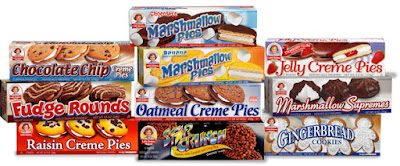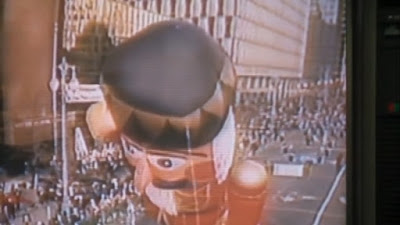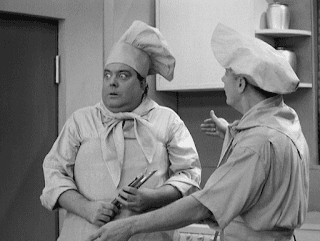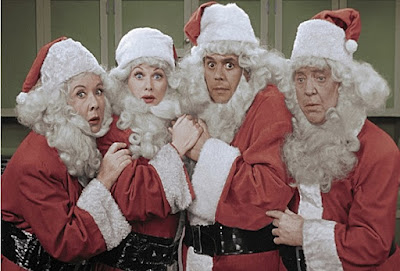I've written a few times before about my love for the classic sitcom "I Love Lucy." Growing up, my Dad introduced me to the show during the early years of Nick-at-Nite. As I consider them, the "Golden Years" of Nick-at-Nite, "I Love Lucy" was a staple on the network. The Block Party Summer's "Lucy Tuesdays" and the frequent "Whole Lotta Lucy" marathons during the year were integral to building my love for the show.
When I was young, I had a pretty early bedtime, and even though in the summer my bedtime would be quite a bit later, I'd usually only get to see the first episode at 9PM, or if I was lucky, the 9:30 episode. My Dad would record them on VHS for me, and I'd watch them the next morning before starting my day of summer-time fun.
I was, and still am, a fan of sappy series finale episodes. As a kid, I specifically remember seeing the Happy Days finale on a Saturday afternoon rerun. After all of the storylines were wrapped up and the episode was over, the actors came back on-screen (out of character) and said thank you and goodbye. It was sometime around 1993, and here I am, about 9 years old, upset that a show that ended 20 years prior was over. What can I say? I'm an old soul with a sensitive side that likes when things get a proper ending.
Knowing this, you can see why I was confused when "I Love Lucy's" final episode didn't say goodbye. There was no mention that it was the end, nor did they conclude any storylines. It ended just like any regular old episode. Lucille Ball did include her two real-life children in the background as her own sort of goodbye, but I didn't know that at the time.
Then, in 1994, Nick at Nite started running something called the "Lucy-Desi Comedy Hour" along with regular "I Love Lucy" episodes. At first, I thought this was just another programming block like the "Whole Lotta Lucy" marathon, but it would only be an hour marathon instead of all night. That night, Dad and I sat down to watch the first episode together. He knew what we were about to watch, and I guess since he never explained it to me, he figured I knew what it was too.
I was amazed to find out it wasn't an hour of "I Love Lucy" but a continuation of the story of the Ricardos and Mertzes living in Westport, Connecticut. Except, it seemed like they were hardly ever there. They were always taking a trip somewhere, like Las Vegas or Alaska.
Which, honestly, suits me just fine. As I've mentioned before in other articles, I have real wanderlust and enjoy a good "vacation" story. The Hollywood episodes of "I Love Lucy" were always my favorite, so why would a trip to Havana, Mexico, or Japan be any different?
So, what exactly WAS the "Lucy-Desi Comedy Hour," you ask?
Long story short, it was a collection of 13 one-hour-long "specials" that aired between 1957 and 1960. The show is considered a follow-up to "I Love Lucy" and features the same cast of characters: Lucy and Ricky Ricardo, Fred and Ethel Mertz, and Little Ricky.
Confusingly, the show was originally billed as the "Ford Lucille Ball-Desi Arnaz Show" and then as the "Westinghouse Desilu Playhouse Presents The Lucille Ball-Desi Arnaz Show." I much prefer the Lucy-Desi Comedy Hour moniker that was used for syndication purposes.
You regular readers of this site know that try as I might, I can't just leave you with "long story short."
So, what really happened?
As I'm sure many of you are aware, as Lucy and Ricky were at their peak on "I Love Lucy," the real-life marriage of Lucy and Desi was falling apart. The two struggled to keep up appearances and the busy television schedule of producing 26 weekly half-hour episodes of the nation's most popular sitcom. They were also running a major television production studio, Desilu, at the same time.
It was not publicly known when "I Love Lucy" came to a close, but Desi Arnaz was suffering from serious health problems. His doctors had ordered him to cut back on his work schedule, and when he entered negotiations with CBS on Season 6, he asked that the show be changed to the hour-long format to reduce the filming schedule. CBS executives, who had balked at that request the previous two years, talked Desi into one more season of half-hour programs.
During that final season of "I Love Lucy," the characters moved to Connecticut to allow the writers to expand script ideas because, as Desi once said, "we'd used up every conceivable storyline that could be set in the tiny New York apartment." After the 6th season of I Love Lucy, Desi put his foot down. No more weekly half-hour shows.
Publicly, CBS and Desilu Studios said the change to the highly successful format was to "make big changes while we're still ahead." Desi said, "It would be ridiculous for us to wait until people got sick and tired of the regular half-hour every Monday night and then make a big change."
In reality, he needed the change for his health and marital problems. At-the-time President of CBS, William Paley, has said he would have sued Desilu had Arnaz's health not been such an issue but agreed to the change.
The duo signed a deal to produce 10 original episodes per season. Due to the high cost of production, Arnaz cut that to eight and then only five. Five episodes were made during seasons one and two (57-58 and 58-59, respectively), and just three episodes were produced in the final season (59-60.)
"The Comedy Hour" would keep with the main plotlines of "I Love Lucy" but allowed the production staff to drop the secondary characters on the show and substitute them with celebrity guest stars. This concept had worked very well during the Hollywood episodes of "I Love Lucy's" seasons 4 and 5. The core cast of The Ricardo's and Mertzes was kept together, and only once did a secondary character appear. Lucy's mother, Mrs. McGillicuddy, returned for a brief appearance in "The Ricardos go to Japan" as Little Ricky's babysitter.
If you're like me, you're wondering how exactly it took the pressure off of him playing Ricky and allowed him time to rest.
While he was still a central character of the show, Ricky doesn't play a significant part in the episodes and has much less interaction with Lucy than in the original series. Each episode features the standard plot: Ricky doesn't allow Lucy to do something. This allows Lucy to interact with the guest stars against Ricky's wishes behind his back. Ricky then reappears at the end of the episode to scold Lucy before they reconcile.
I hadn't noticed before, but it's true. Ricky really finds a reason to disappear during each episode. Ricky's personality is also much more low-key than the firey Cuban he portrayed on "I Love Lucy." This is clearly a reflection on Desi himself. By the end of the "Comedy Hour" run, Ricky looks tired and downright depressed.
Fred and Ethel found themselves with significantly reduced screen time in favor of the guest celebrity of the week. Vivian Vance, who played Ethel Mertz, was quite upset by this and had to be talked into staying on the show several times. On the other hand, William Frawley, who portrayed Fred Mertz, was thrilled with his reduced work schedule.
Reflecting the final season of "I Love Lucy," the Comedy Hour portrayed the Ricardo's still living in Westport, Connecticut, highlighting the booming growth of the suburbs in 1950s America. Ricky still commuted to New York City, where he owned Club Babalu, the former Tropicana Club. Little Ricky was more of a fringe character and was only featured coming and going. The Ricardos also no longer had interactions with the neighbors in Westport, except the new neighbor and celebrity guest for the week, Tallulah Bankhead. Westport and Lucy's involvement in its activities were a major part of season 6 of "I Love Lucy," but besides a brief mention of the PTA, the town is an afterthought during "The Comedy Hour."
Episode 1, "Lucy Takes a Cruise to Havana," aired on November 6, 1957.
Originally 75 minutes long, after the first showing, it was edited down to a 60-minute run time. The story featured guest star Hedda Hopper, a famed Hollywood columnist, who wanted to know how Ricky and Lucy met. As Lucy and Ricky tell the story, we flashback to Lucy McGillicuddy and her friend Susie some twenty years earlier on a cruise to Havana. Ann Sothern portrays Susie McNamara, a crossover performance from her role in one of CBS' other shows, "Private Secretary." After arriving in Havana, the two meet a pair of locals who claim to be tour guides, Ricky Ricardo and his friend Carlos Garcia. Carlos is played by Cesar Romero, who gave us the classic performance as "The Joker" in the 1960's version of Batman. Also along for the cruise is another guest star, Rudy Vallee... and a surprise appearance by Fred and Ethel Mertz on their honeymoon. Not only did Lucy meet Ricky in Havana, but this is where she met Fred and Ethel as well.
Episode 2, "The Celebrity Next Door," aired on December 3, 1957.
In this episode, guest star Tellulah Bankhead moved in next door to the Ricardo family in Westport, Connecticut. As in Hollywood, once Lucy discovers a celebrity nearby, she insists on becoming friends immediately. Lucy invites Tellulah to a fancy dinner, where she has Fred and Ethel posing as hired help. By the end of the episode, Lucy has involved Ricky, The Mertzes, and Ms. Bankhead in the PTA Pageant Show. Initially, Bette Davis was set to be the celebrity guest but was injured in a horseback riding accident just before filming.
Episode 3, "Lucy Hunts Uranium," aired on January 3, 1958.
This is my favorite episode of the whole series. For this episode, Ricky's band has been hired to sing at the Sands Casino in Las Vegas, Nevada. Somehow, Lucy gets it in her head she'll become rich and famous by hunting for uranium while she's out in the desert, but Ricky forbids it. Fred and Ethel are eager to find some uranium themselves, and a novelty newspaper headline gets the entire town into a radioactive frenzy. Soon, Ricky, Lucy, Fred, Ethel, and celebrity guest stars Fred McMurray, and wife June Haver are on the hunt... and a race to claim their money.
Episode 4, "Lucy Wins a Race Horse," first aired on February 3, 1958.
Lucy wins a racehorse for Little Ricky, but in order to afford to keep it, she convinces the celebrity guest star Betty Grable to help her enter it in a race. The two enter the horse at Roosevelt Raceway in Westbury, New York, on Long Island. The race track now an AMC Movie Theater and strip mall, if you're curious.
Episode 5, "Lucy Goes to Sun Valley," first aired on April 14, 1958.
In Season One's final episode, we find the Ricardos and Mertzes on vacation to Sun Valley, Idaho. Lucy has grown tired of being second place in Ricky's life (a little art imitating life) and demands to be taken on a second honeymoon. It'll be her third honeymoon, actually, if you count the European voyage during the regular "I Love Lucy" run, with an entire episode titled "Second Honeymoon." Sun Valley Resort in Idaho was actually a favorite spot to vacation and relax for Lucy and Desi, and they naturally worked it into the show. Once there, Lucy and Ethel hatch a scheme, along with celebrity guest star Fernando Lamas, making Ricky jealous enough to make Lucy number one again.
Episode 6, "Lucy Goes to Mexico," first aired on October 6, 1958.
This episode kicks off Season Two as Ricky finds himself booked on a USO show in San Diego, and the gang all heads west. The gang crosses the border into Mexico for some shopping, but unfortunately, a stowaway situation with this week's guest celebrity causes problems at the border on the way back. French actor Maurice Chevalier guest stars this week, written in by Desi and Lucy on purpose. He was originally the actor to guest star in the "I Love Lucy" episode in Paris during Season 5, but that turned out to be Charles Boyer in the appropriately named episode "Lucy Meets Charles Boyer." When it didn't work out the first time with Chevalier, they kept him in mind for this episode, even if it's funny to see the French actor in Mexico.
Episode 7, "Lucy Makes Room for Danny," aired on December 1, 1958.
In this episode, Ricky gets booked again in Hollywood, and the Ricardo's rent out their house. Danny Thomas, Marjorie Lord, Rusty Hamer, and Angela Cartwright appear as their cross-over characters from "The Danny Thomas Show." A longtime friend of Lucille Ball, Gale Gordon, also makes a guest appearance. When Ricky's deal falls through, the Ricardo's find themselves homeless and have to move in with Fred and Ethel in the guest house.
Episode 8, "Lucy Goes To Alaska," aired February 9, 1959.
This episode is very topical for the time, as Alaska officially became the 49th state just weeks prior on January 3, 1959 (although this episode was produced a month earlier in December.) Fred and Ricky have purchased land in the new state of Alaska in a get-rich-quick oil scheme, and while there to inspect the land, Ricky agrees to perform on a local television show. When celebrity guest Red Skelton finds out that his partner can't make the show, Lucy finds a way to scheme her way into the act. In a funny scene, Lucy keeps falling out of her hammock in their overcrowded hotel room. Later in the show, Lucy and Red Skelton find themselves in a bush plane when suddenly the pilot falls ill, and they must land the aircraft themselves!
Episode 9, "Lucy Wants a Career," aired on April 13, 1959.
Aside from a few scenes with Milton Berle in Season Three, this was the final episode filmed in front of a live studio audience. One afternoon, a bored Lucy does a little math and figures that she's prepared over 19,000 meals since marrying Ricky and washed over 219,000 dishes! Lucy decides to interview to be the assistant to celebrity guest star Paul Douglas for his TV show. To weed out the younger and better-looking candidates, Lucy spreads the rumor that Douglas was a womanizer and a wolf. The Paul Douglas show's sponsor finds out that Lucy is a housewife and hires her on the spot, much to Douglas' chagrin. Her first day on the job lands her with a 3-year contract for the show, and she soon only gets to see Ricky for a few moments a day as they pass each other in the train station. As a cute side note, these two ships passing in the night mirror Lucy and Desi Arnaz's real-life some twenty years earlier as they would meet in a train station after she finished her day and he was just starting his at the nightclub. Lucy soon wants out of the contract, and after taking some sleeping pills, more Lucy shenanigans occur.
Episode 10, "Lucy's Summer Vacation," first aired on June 8, 1959.
Lucy and Ricky go on a summer vacation in the cabin of a friends' summer home on the fictional Lake Watchasokapoo in Vermont. The Ricardos soon find out that this friend has also loaned his cabin to celebrity guest stars Howard Fuff and his wife Ida Lupino for the same week! The girls quickly get tired of the men fishing all day and playing cards all night. They dress up and try to woo the men into a romantic evening, and when all else fails, Lucy comes up with another crazy scheme. This episode was the final episode of Season Two and the first to not be filmed entirely in front of a studio audience. To explain their disappearance from the show, Fred and Ethel were on their own vacation in Atlantic City, and Little Ricky was away at Boy Scouts Camp. There are also reports of rising tensions between Lucy and Desi as the marriage and Desi openly flirted with women, especially Ida Lupino, in front of Lucy during filming. Lucy also had a falling out with long-time director Jerry Thorpe and fired him halfway through filming. Lucy had complained confidentially to Jerry Thorpe about Ida Lupino's acting ability and her flirtations with Desi. Thorpe apparently told Lupino about the complaints, and when Lucy found out, she fired him. Desi directed the final portion of the episode.
Episode 11, "Milton Berle Hides Out At The Ricardos," aired September 25, 1959.
This episode kicks off Season Three, which was originally meant to be five episodes. Due to off-screen conflicts between Desi and Lucy, the season was cut down to three episodes. In this particular episode, Lucy once again gets involved in the Westport PTA Entertainment Committee. In an attempt to get Milton Berle to perform at the show, she invites him to stay at their house away from the noise of the city so he can finish writing his book in peace. Lucy tries to hide Milton from Ricky's disapproving eyes, and he quickly begins to think Lucy is having an affair. In one iconic scene, Lucy, Ricky, and Milton Berle hang from a swinging construction bucket 20 stories above New York City.
Episode 12, "The Ricardos Go To Japan," first aired November 27, 1959.
This is the first episode not filmed in front of any studio audience but was shown as a test screening in front of a small audience to gauge reactions for the laugh track. The Ricardo's and Mertzes fly to Tokyo on United Airlines, and Fred makes Ethel pay for her own ticket, so she pawns her family silver to be able to afford to go. Kathryn Card makes her only Comedy Hour appearance as Lucy's Mom, Mrs. McGillicuddy, as she is set to babysit Little Ricky while the main cast takes the trip. Lucy immediately has a list of tourist spots she wishes to see, but her main goal is to find genuine Japanese pearls. Celebrity guest star Bob Cummings is in Tokyo filming his next movie, and Lucy and Ethel come upon him while he's bathing in a Japanese bathhouse. The pair pose in the most iconic image for the Comedy Hour as two geisha girls.
Episode 13, "Lucy Meets the Mustache," first aired April 1, 1960.
In the Comedy Hour's final episode, airing appropriately on April Fool's Day, the fighting between Lucy and Desi had gotten so great that the two only spoke through intermediaries on set. The premise of what ended up becoming the series finale was that Ricky has become very depressed as his acting job offers have all dried up. He's tired of the nightclub routine every night and is upset he hasn't become a megastar in Hollywood. Lucy even mentions that Ricky wasn't even acknowledged in The Ed Sullivan Show's audience, as celebrities often were at the time. To cheer him up and boost his career, Lucy, Fred, and Ethel try to get him booked on Ernie Kovac's television show. Kovac would be the "mustache" referred to in the episode title. Lucy dresses up as a chauffeur for Mr. Kovac and dons a fake mustache herself. As they always did, Ricky and Lucy kiss and make up at the end of the episode. This time it would be the final time, as the series and the Ricardos came to an end.
The show finished production on March 2nd, which was Desi's 43rd birthday and 9 years to the day Lucille Ball first played Lucy Ricardo in the "I Love Lucy" pilot episode. Lucille Ball said that in the final scene, when Ricky pulls Lucy in for a kiss, she began to cry. They reshot the scene several times with not a dry eye in the room as everyone began to realize it had all come to an end. Although it had yet to be publicly announced, all of the Desilu executives, cast, and crew knew the fate of the stars' marriage and how it would affect the series.
The next morning, Lucille Ball filed for divorce from Desi Arnaz on the grounds of mental cruelty. After a decade of being America's favorite couple, Lucy and Desi never worked together on-screen again.
That final episode aired 61 years ago to the day that this article will be posted (April 1, 2021.)
Desilu had already signed several celebrity guest stars for what was supposed to be the fourth season. One confirmed for the ill-fated fourth season was Debbie Reynolds.
Ratings for the first two seasons were strong, but the ratings began to reflect a loss of interest by the third season. The habit of viewing the series weekly had ended as the shows grew further and further apart in air dates. Television critics of the time would comment on the lackluster quality and poor scripts. The cast performances were also frequently panned as the interaction between Lucy and Ricky was not as good as it once was, reflecting their real-life problems. For many viewers, the loving relationship between the Ricardos was a vital component of the original success of "I Love Lucy."
While the critics consider "The Lucy-Desi Comedy Hour" a fairly poor continuation of "I Love Lucy," I tend to think otherwise. The cast, which mostly remained intact from the original series, and the use of celebrity guest stars and different locations made this series worthwhile for me. While "I Love Lucy" is only, at the time of writing, available on the Paramount Plus streaming service, the Lucy-Desi Comedy Hour is not available for streaming anywhere. If you have the full series DVD collection, you can find those 13 episodes there. You may be able to view them in places like YouTube and other sources, but... I wouldn't tell you to go watch an illegal copy.
But, go watch it if you can. :)






















.png)





Comments